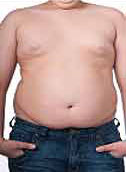- 8 Ways to Increase Dopamine Naturally
- 7 Best Breads for Maintaining Stable Blood Sugar
- Gelatin vs. Collagen: Which is Best for Skin, Nails, and Joints?
- The Long-Term Effects of Daily Turmeric Supplements on Liver Health
- Could Your Grocery Store Meat Be Causing Recurring UTIs?
- Are You Making This Expensive Thermostat Error This Winter?
- Recognizing the Signs of Hypothyroidism
- 10 Strategies to Overcome Insomnia
- Could Artificial Sweeteners Be Aging the Brain Faster?
- Techniques for Soothing Your Nervous System
Gene Mutation Tied to Higher Obesity Risk in Kids


THURSDAY, Oct. 24Obesity is on the rise among children, and a particular genetic mutation might play a role for some kids, a new study suggests.
Researchers in Britain conducted genetic analyses of more than 2,100 severely obese youngsters. They found that those with mutations in the KSR2 gene had larger appetites and slower metabolism than those with a normal copy of the gene, according to the study published in the Oct. 24 issue of the journal Cell.
“Changes in diet and levels of physical activity underlie the recent increase in obesity; however, some people gain weight more easily than others,” study author Sadaf Farooqi, of the University of Cambridge, noted in a journal news release. “This variation between people is largely influenced by genetic factors. The discovery of a new obesity gene, KSR2, demonstrates that genes can contribute to obesity by reducing metabolic rate — how well the body burns calories.”
The findings could someday lead to new treatments for obesity and type 2 diabetes, the researchers said.
Farooqi and colleagues had previously found that deleting the KSR2 gene led to obesity in mice, highlighting the gene’s role in controlling energy balance and metabolism. These findings confirm KSR2’s role in the regulation of weight and metabolism in humans.
“This work adds to a growing body of evidence that genes play a major role in influencing a person’s weight and may be useful for developing new ways to treat people who are heavy and develop diabetes,” Farooqi said.
More information
The American Academy of Pediatrics has more about childhood obesity.
Source: HealthDay
Copyright © 2026 HealthDay. All rights reserved.










